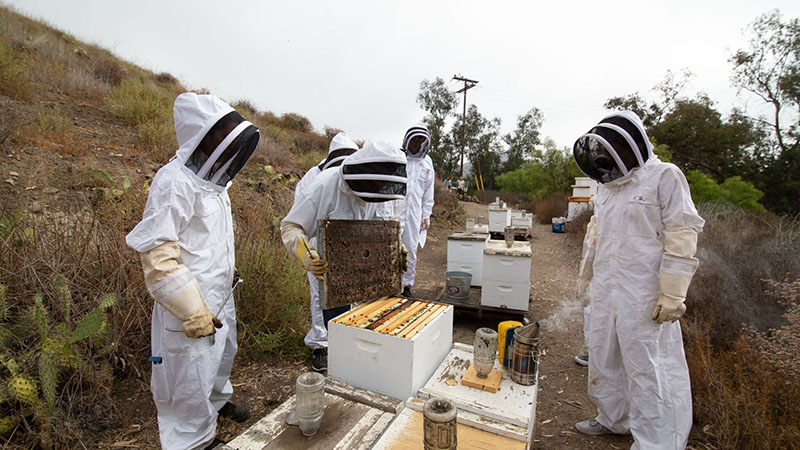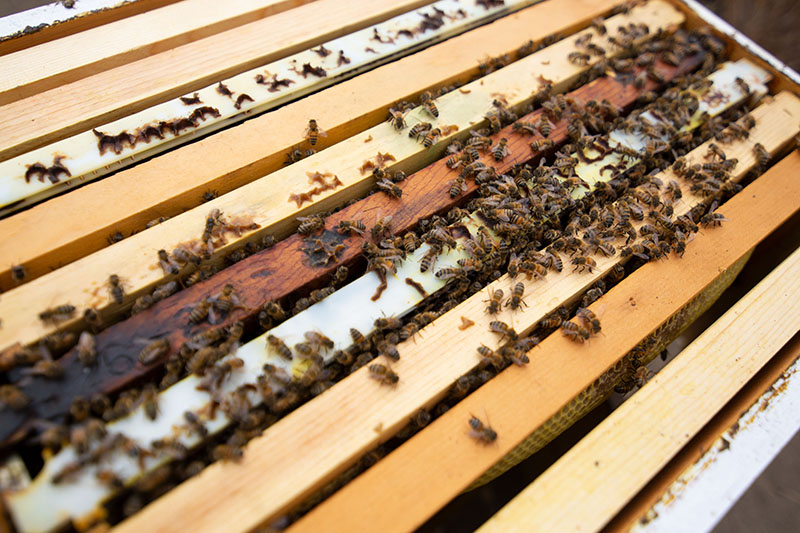 Oct. 4, 2018 — A student plant enthusiast, a faculty bee expert and a campus sustainability staff member pooled their efforts and helped CSU Channel Islands (CSUCI) become the first four-year university in California to be named a Bee Campus USA.
Oct. 4, 2018 — A student plant enthusiast, a faculty bee expert and a campus sustainability staff member pooled their efforts and helped CSU Channel Islands (CSUCI) become the first four-year university in California to be named a Bee Campus USA.
The designation has been granted to 51 campuses across the nation so far by the Xerces Society for Invertebrate Conservation, a nonprofit organization based in Portland, Oregon.
“The program aspires to make people more PC, pollinator conscious, that is,” said Scott Hoffman Black, Xerces’ executive director. “If lots of individuals and communities begin planting native, pesticide-free flowering trees, shrubs and perennials, it will help to sustain many, many of species of pollinators.”
Pollinators include many bee species as well as butterflies, moths, beetles, flies and hummingbirds, which are responsible for the reproduction of 90 percent of the world’s wild plant species and one in every three bites of food we consume.
“Honeybee and native bee populations have been declining for a long time now, at least over the last decade,” said Associate Professor of Biology and bee expert Ruben Alarcón, Ph.D. “It’s been a problem ensuring our wild plants can reproduce and we need these pollinators for the foods that we eat.”
The idea to apply for Bee Campus USA status began with Sustainability & Operations Analyst Coleen Barsley and her student assistant at the time, Biology major Jazmin Horvet, who is now a student assistant in the Biology program.
“We were always looking for ways to make the campus more sustainable and Coleen came across Bee Campus USA,” Horvet said. “I started filling out the application and wrote a few paragraphs about how we could involve students for service learning and came up with an idea for a Bee Club.”
Horvet, who plans to work in environmental conservation after she graduates in spring of 2019, developed her interest in bees and pollinators through her love of plants, and through Professor Alarcón’s Apiculture & Bee Biology class.
“I’m passionate about plants,” Horvet said. “And plants are not something to be studied in a vacuum. They are a component of an ecosystem. To study plants is to study pollinators, so my interest in bees came from my interest in plants.”
Alarcón provided the academic elements necessary to qualify as a Bee Campus by providing courses to educate students about pollinators. Barsley helped meet the criteria involving the campus grounds, by arranging for the planting of more pollinator-friendly native plants, and campus signage aimed at educating the public about pollinators.
“I talked it over with our grounds manager and Jazmin investigated our pest management system,” Barsley said. “We looked at a lot of the requirements and thought ‘Wow! We’re already doing this.’”
 CSUCI also has its own apiary (bee farm), which Alarcón had installed in 2017 with the help of local beekeepers. Alarcón originally installed 28 hives of which about 20 are still active.
CSUCI also has its own apiary (bee farm), which Alarcón had installed in 2017 with the help of local beekeepers. Alarcón originally installed 28 hives of which about 20 are still active.
“We can teach students basic beekeeping skills, making CSUCI one of only four CSU campuses to offer such courses,” Alarcón said.
Horvet is in the process of starting a campus Bee Club along with classmates from one of Alarcón’s classes. Any CSUCI student is welcome to join Bee Club, which will launch at the beginning of the spring semester. Horvet has also helped Chemistry students create a pollinator-friendly garden on the second floor courtyard of Sierra Hall.
Professor Alarcón said plans for public outreach are also in the works so that CSUCI can help educate the public about bees and other pollinators and their importance to our ecosystem.
“I think we can be a leader in the academic world as an institution bringing the plight of the pollinators to students and the public,” Alarcón said. “We’re surrounded by agriculture and we have a of lot of area beekeepers who help pollinate our local avocados and raspberries. We’re in a great environment to not only teach students about bees and bee biology, but to work with local beekeepers to ensure they’re doing what’s best for the bees.”
